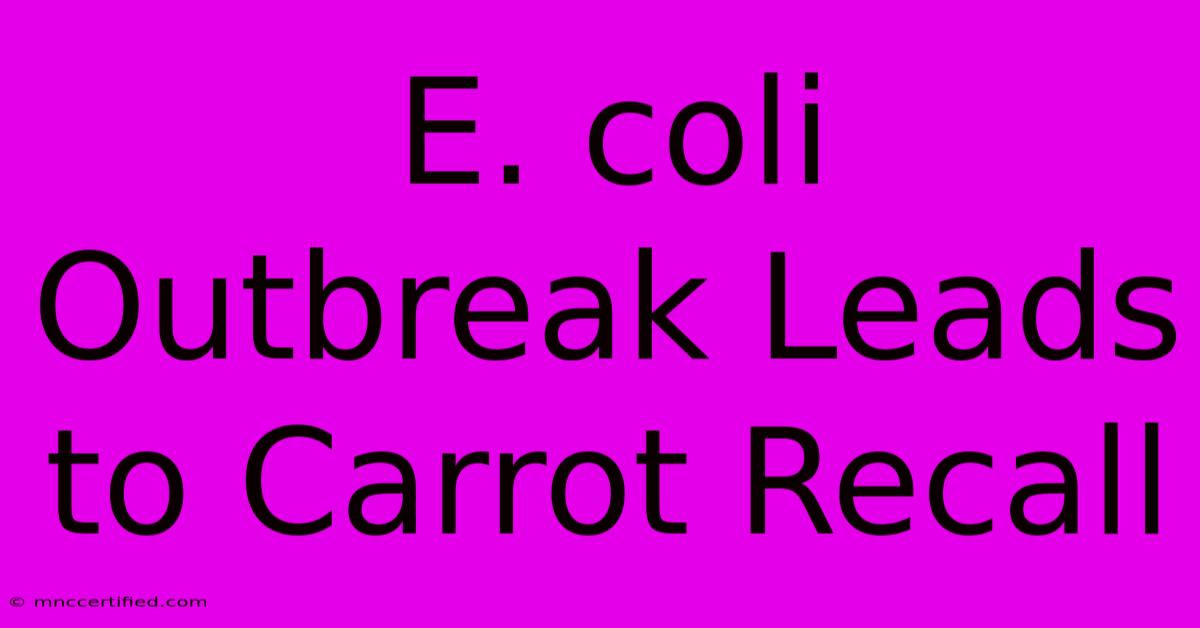E. Coli Outbreak Leads To Carrot Recall

Table of Contents
E. coli Outbreak Leads to Widespread Carrot Recall: What You Need to Know
A concerning E. coli outbreak has prompted a significant recall of carrots across several states. This article will delve into the details of the outbreak, the recalled products, and crucial safety measures consumers should take. Understanding this situation is vital for protecting your health and the health of your family.
Understanding the E. coli Outbreak
The Centers for Disease Control and Prevention (CDC) is currently investigating a multi-state outbreak of Shiga toxin-producing E. coli (STEC) O157:H7 infections linked to the consumption of raw carrots. This specific strain of E. coli is known to cause severe illness, including bloody diarrhea, stomach cramps, and vomiting. In some cases, it can lead to more serious complications like hemolytic uremic syndrome (HUS), a type of kidney failure.
Key factors driving the investigation include:
- The number of reported illnesses: The CDC is tracking a significant number of confirmed cases across multiple states, highlighting the widespread nature of the contamination.
- Identifying the source: Tracing the outbreak back to a specific source is crucial for preventing further illnesses. The investigation involves extensive epidemiological analysis, including interviewing those affected and analyzing food samples.
- Preventing further spread: Swift action is essential to contain the outbreak and prevent further infections. This involves immediate recall of contaminated products and public awareness campaigns.
Recalled Carrot Products and Retailers
Several brands and retailers have issued recalls of their carrots due to potential E. coli contamination. It's critical to check your refrigerator and discard any carrots matching the descriptions outlined in the official recall notices. These notices are frequently updated, so it is advisable to check the FDA website and the websites of major grocery chains for the most up-to-date information.
Information to look for on recall notices includes:
- Brand name: The specific brand of carrots involved in the recall.
- Product description: Details about the type of carrots (e.g., whole, baby, shredded) and packaging.
- Best-by or use-by dates: Specific dates indicating which batches are affected.
- Lot numbers: Unique identifiers to pinpoint the exact product.
- Point of sale: Where the carrots were purchased.
Remember: Don't rely solely on this article for recall information. Always consult official sources such as the FDA and CDC websites for the most current and accurate details.
Protecting Yourself from E. coli Contamination
While this outbreak is linked to carrots, E. coli can contaminate various foods. Following proper food safety guidelines is crucial in mitigating the risk of infection.
Key Food Safety Practices:
- Wash your hands thoroughly: Wash your hands with soap and water for at least 20 seconds before and after handling food.
- Wash produce carefully: Thoroughly wash all fruits and vegetables, including carrots, under running water before consuming. Consider using a produce wash.
- Cook food to safe internal temperatures: Ensure meat, poultry, and other potentially hazardous foods are cooked to the recommended temperatures to kill harmful bacteria.
- Separate raw and cooked foods: Avoid cross-contamination by keeping raw and cooked foods separate during preparation and storage.
- Refrigerate perishable foods promptly: Store perishable items at the correct temperature to slow bacterial growth.
Symptoms of E. coli Infection and When to Seek Medical Attention
If you suspect you have an E. coli infection, monitor for symptoms like:
- Diarrhea (often bloody): This is a key indicator of E. coli infection.
- Stomach cramps: Severe abdominal pain is common.
- Vomiting: This can accompany the other symptoms.
- Fever: While not always present, a fever can indicate a more severe infection.
Seek immediate medical attention if you experience:
- Severe dehydration: Signs include dizziness, decreased urination, and dry mouth.
- Bloody diarrhea: This suggests a more serious infection.
- High fever: A high fever warrants prompt medical attention.
This outbreak serves as a vital reminder of the importance of food safety. By following these guidelines and staying informed about recall notices, you can significantly reduce your risk of E. coli infection. Remember to always consult official sources for the most accurate and up-to-date information regarding the carrot recall and E. coli outbreaks.

Thank you for visiting our website wich cover about E. Coli Outbreak Leads To Carrot Recall. We hope the information provided has been useful to you. Feel free to contact us if you have any questions or need further assistance. See you next time and dont miss to bookmark.
Featured Posts
-
Giants Sideline Jones Skip 23 M Guarantee
Nov 19, 2024
-
26 B Minerals Found On Megalodon Teeth
Nov 19, 2024
-
Attorney For Homeowners Insurance
Nov 19, 2024
-
Carrot Recall Grimmway Farms Affected Products
Nov 19, 2024
-
Time Insurance Agency Punta Gorda
Nov 19, 2024